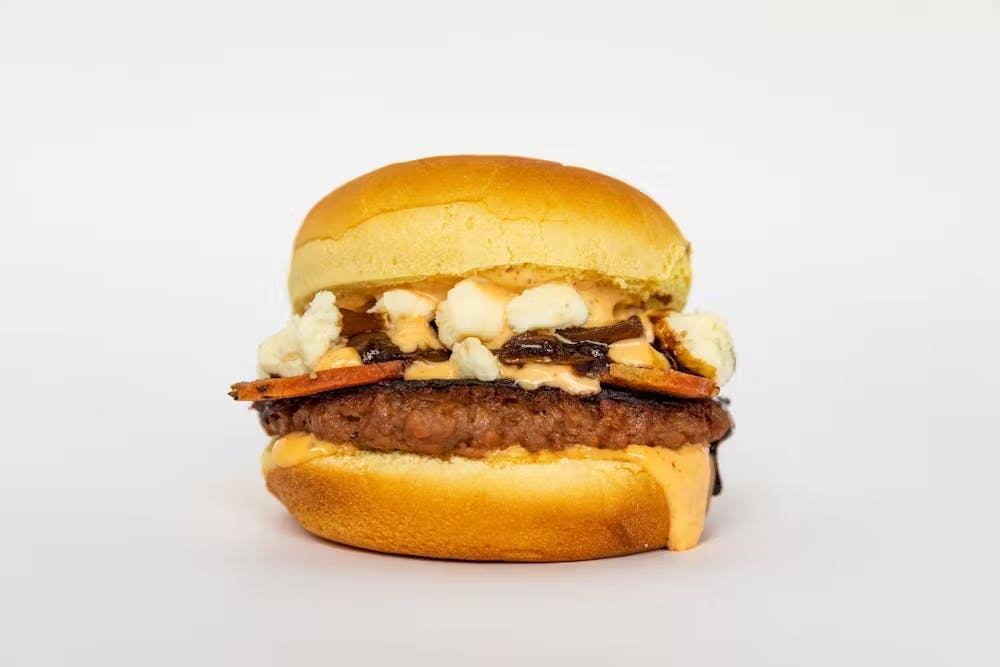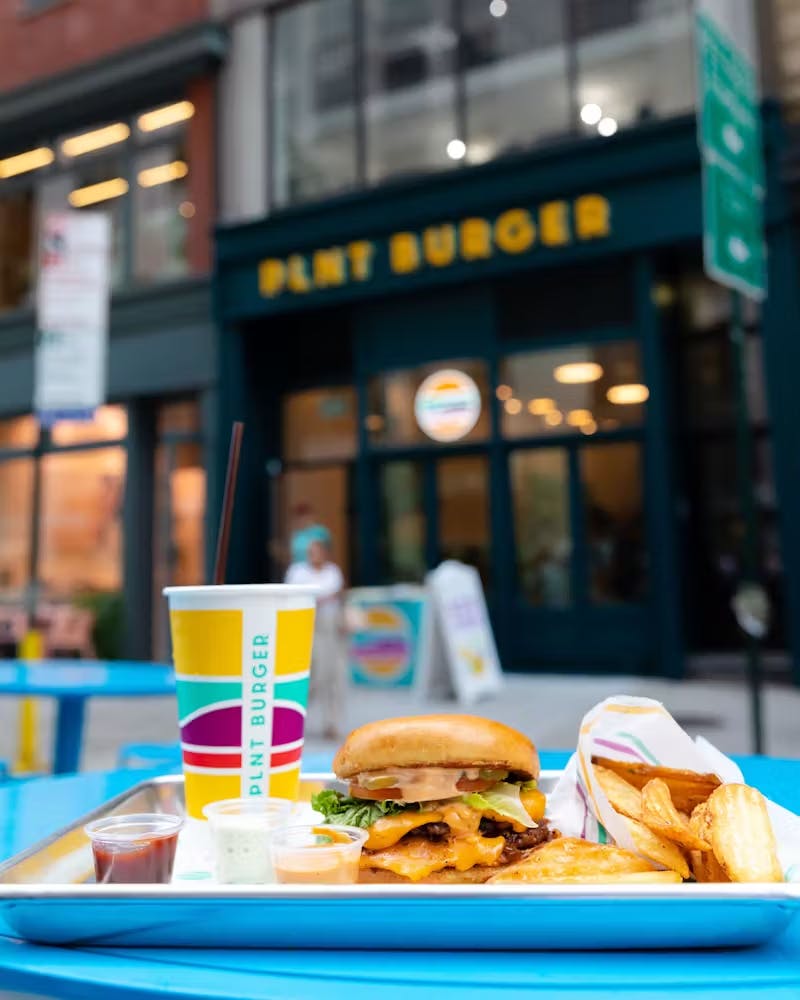PLNT-Based Vegan burgers

THE VEGAN BURGER: YOUR GUIDE TO THE MEATLESS ALTERNATIVE REDEFINING AMERICA’S FAVORITE

It’s no wonder burgers are a fan favorite. They’re portable and easy to eat on the go. They’re a fast-casual fave—nothing fancy, but always delicious. They’re like little food chameleons, taking on different flavors depending on your unique burger vibe. They’re nostalgic and remind many of us of our delectable burger-filled childhoods.
Who doesn’t love a good burger?
The popularity of the burger has won it several different burger spinoffs: the turkey burger, portobello mushroom burger, veggie burger, salmon burger, bean burger, elk burger, plant-based burger, and vegan burger.
Vegan burgers are really having a moment. They’re revolutionizing the food scene and mimicking the taste, texture, and nutritional profile of traditional animal-based meat products. Vegan burgers are nutrient-dense, tasty, good for our planet, they’re cruelty-free, and they’re disrupting the meat-lovers food scene by sourcing plant-based ingredients to create healthy and super creative alternatives to meat.
In this ultimate guide, you’ll learn everything there is to know about vegan burgers, from how they compare to animal-based burgers to pro tips on how to cook them at your next cookout.
WHAT MAKES A BURGER VEGAN?
DEFINING "VEGAN"
A vegan product means that it's free from any animal-derived ingredients. No meat, dairy, eggs, or any other ingredient sourced from animals. Veganism extends beyond just food—it's a lifestyle choice centered around minimizing harm to all living creatures and our environment.
VEGAN BURGER INGREDIENTS
Vegan burgers are typically packed with a mix of vegetables, grains, peas, legumes, and healthy fats. The vegan alternatives to traditional animal-based burger patties can be widely diverse.
THE HEALTH BENEFITS OF VEGAN BURGERS
Vegan burgers can offer several health benefits, including a lower saturated fat content, high fiber, and a good source of proteins. Additionally, they contribute to a lower carbon footprint compared to their meat counterparts.
VEGAN BURGERS AND SUSTAINABILITY
LOWER GREENHOUSE GAS EMISSIONS
Embracing vegan alternatives has the power to decrease greenhouse gas emissions. Intensive livestock farming is known to be a large contributor to these emissions, particularly methane and nitrous oxide, both of which have a far greater warming effect than carbon dioxide. Opting for vegan alternatives where you can minimize the need for animal products, reduce the livestock numbers needed for food production, and ultimately reduce emissions. Plant-derived proteins like lentils, peas, and beans, typically found in vegan burger recipes, have a simpler, more energy-efficient production process, leading to a smaller overall emission footprint.
EFFICIENT LAND USE
The demands of livestock farming are significant, both in terms of the space needed for animals to graze and the additional land necessary just for growing crops to feed those animals. Cultivating plants directly for human diets requires much less land. Vegan alternatives diminish the demand for extensive amounts of land used in animal agriculture. This land can then be reallocated for growing diverse food crops or even left to revert to a natural habitat, which is a big win for environmental preservation.
PRESERVE WATER RESOURCES
Vegan alternatives can significantly cut down on water consumption. Plant-based foods typically require less water for production. Foods that are part of a vegan diet, such as fruits, vegetables, legumes, and grains, tend to be more water-efficient compared to the water expended to yield the same quantity of animal protein. A shift toward vegan alternatives means preserving water resources and contributing to the sustainability of our planet's water supply.
REDUCING DEFORESTATION
The land needed to rear livestock and cultivate feed crops remains a main cause of deforestation. Vast forests, especially tropical rainforests, are often cleared to create space for pastures or to grow animal feed. This not only results in the loss of trees but also significantly impacts biodiversity and our ecosystem.

VEGAN VS PLANT BASED
The term plant-based very literally means that it's made exclusively from plants. Vegan diets eliminate all animal products, while plant-based diets may still include some animal products.
VEGAN VS VEGETARIAN
For the most part, everything that is vegan is vegetarian. But, not everything that is vegetarian is vegan. Let us break this down. Vegetarians may consume some products made from animals like milk, eggs, dairy, or honey while vegans do not consume or use animal products of any kind.
VEGAN BURGERS VS MEAT BURGERS
YOUR HEALTH
Both vegan burgers and meat burgers can satisfy a craving and fulfill a protein goal, but there are some health benefits and differences between the two. Generally, vegan burgers tend to be lower in saturated fat and higher in fiber. Vegan burgers also can be lower in calories and fat than traditional meat burgers. Plus, they're cholesterol-free and can provide a variety of vitamins and minerals.
THE PLANET
The environmental impact of vegan burgers compared to traditional meat burgers is vastly different. Plant-based proteins require less land, water, and natural resources to produce. Choosing a vegan burger is a choice that’s generally more sustainable than an animal-based burger.
THE ETHICS
By opting for a vegan burger, you're choosing a meal that doesn’t harm animals. This choice aligns with many who have adopted a vegan lifestyle, but it doesn’t only apply to vegans. Many people choose vegan options on a smaller scale simply as a way to reduce harm to animals.
VEGAN BURGERS VS VEGGIE BURGERS
While both options may contain veggies, the key difference between vegan burgers and veggie burgers is that vegan burgers are made from a protein and are made to mimic the flavor and texture of actual meat while veggie burgers are not meant to evoke meat properties at all.
HOW TO INCORPORATE VEGAN BURGERS INTO YOUR DIET
Whether your goal is to eventually become vegan or you’re looking to switch it up and have one meal or day per week dedicated to vegan alternatives, the key is always moderation. Start slow and consider vegan burgers as one of the many protein sources in your dietary rotation. Sustainable healthy living doesn’t necessarily mean giving up all the foods you enjoy. Instead, it means diversifying, balancing, and having fun switching some things up.
VEGAN BURGER FAQS
DO VEGAN BURGERS TASTE LIKE MEAT?
Some brands, like Beyond Meat, have designed their vegan burgers to mimic the taste and texture of meat. However, many vegan burgers have their own unique flavors.
WHAT'S THE BEST WAY TO COOK A VEGAN BURGER?
Cooking it on the griddle top is our favorite. Check out our Ultimate Guide for the Best Vegan Burger Recipe for our best tips.
WHERE CAN I BUY VEGAN BURGERS?
You can buy delicious vegan burgers at any of our PLNT Burger locations.
ARE VEGAN BURGERS HEALTHIER THAN MEAT BURGERS?
The specific ingredients in your vegan burger will dictate how nutritious it is. Generally, vegan burgers are lower in saturated fat and cholesterol, and higher in fiber.

